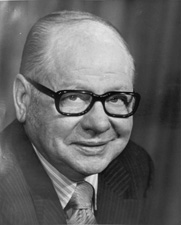Carl Curtis
Carl Thomas Curtis (born March 15, 1905 in Minden , Nebraska , † January 24, 2000 in Lincoln , Nebraska) was an American politician ( Republican Party ) who represented the state of Nebraska in both chambers of the US Congress .
Carl Curtis was born on his family's farm in Kearney County . He attended public schools and later Nebraska Wesleyan University in the state capital Lincoln; he then studied law , passed the bar exam, and began practicing in Kearney County. From 1931 to 1934 he was the district attorney there.
In 1938 Curtis ran for a seat in the United States House of Representatives and was victorious in the election against the Democratic incumbent Charles Gustav Binderup , where he positioned himself in his election manifesto against President Franklin D. Roosevelt and his New Deal . In the following years he was repeatedly confirmed by the electorate before he did not run for re-election in 1954 and instead ran for the US Senate .
Curtis also won this election, whereupon he took up his mandate from January 1, 1955. In the Senate, he remained loyal to his party and supported its line when it came to the anti-communist activities of the 1950s or later the opposition to social programs of the Democrats like Lyndon B. Johnson's Great Society ; however, he also voted for the Civil Rights Act of 1964 . As a confidante of Arizona's Senator Barry Goldwater , he chaired the 1964 Republican National Convention in San Francisco , where Goldwater was nominated as a presidential candidate. Curtis later became a supporter of Richard Nixon after his election as US president and supported his policy in Vietnam . He also stood by Nixon during the Watergate scandal . From 1975 to 1979 he chaired the Senate Republican Conference . In 1978 he did not stand for re-election.
After his political retirement, Curtis returned to working as a lawyer in Lincoln. He also worked for the American Freedom Coalition , a conservative lobby group. After his death on January 24, 2000, Strom Thurmond gave a funeral speech in the Senate.
Web links
- Carl Curtis in the Biographical Directory of the United States Congress (English)
- Carl Curtis in the database of Find a Grave (English)
| personal data | |
|---|---|
| SURNAME | Curtis, Carl |
| ALTERNATIVE NAMES | Curtis, Carl Thomas (full name) |
| BRIEF DESCRIPTION | American politician (Republican Party) |
| DATE OF BIRTH | March 15, 1905 |
| PLACE OF BIRTH | near Minden , Nebraska |
| DATE OF DEATH | January 24, 2000 |
| Place of death | Lincoln , Nebraska |


